
Kathie Malley-Morrison
As the anniversaries of the U.S. bombing of Hiroshima (August 6, 1945) and Nagasaki (August 9, 1945) snuck by with little acknowledgment and limited chagrin in the US, it troubled me that those world-shattering, paradigm-changing events are, for young people growing up in this country today, basically ancient history. Doubly unfortunately, the shared “history” is woefully incomplete, the full story never told. Little learned.
The “history” I was taught in public school, which I still hear echoed today, was that the dropping of those atomic bombs was a necessary, essential, moral way to keep those aggressive, warmongering Japanese from increasing their deadly toll on innocent American lives.
Nobody ever told me that Dwight D. Eisenhower, General of the U.S. Army and Supreme Commander of Allied Forces in Europe during World War II, and later a highly-respected President of the United States, opposed dropping those bombs.
“Secretary of War Stimson, visiting my headquarters in Germany, informed me that our government was preparing to drop an atomic bomb on Japan. I was one of those who felt that there were a number of cogent reasons to question the wisdom of such an act…
“During his recitation of the relevant facts, I had been conscious of a feeling of depression and so I voiced to him my grave misgivings, first on the basis of my belief that Japan was already defeated and that dropping the bomb was completely unnecessary, and secondly because I thought that our country should avoid shocking world opinion by the use of a weapon whose employment was, I thought, no longer mandatory as a measure to save American lives. It was my belief that Japan was, at that very moment, seeking some way to surrender with a minimum loss of ‘face’. The Secretary was deeply perturbed by my attitude…”
Eisenhower’s antipathy regarding the use of nuclear weaponry did not diminish after those blood-thirsty, saber-rattling, cock-crowing events of August 1945 . At the Republican National Convention of August 23, 1956, he warned his party, his country, and the world that:
“We are in the era of the thermonuclear bomb that can obliterate cities and can be delivered across continents. With such weapons, war has become, not just tragic, but preposterous.”
The hour is late; can’t we find a way to address the preposterousness of nuclear arms before tragedy completes envelops the planet and obliterates a large portion of living things? And while we are at it, how about doing something about obliterating lives with drones?


